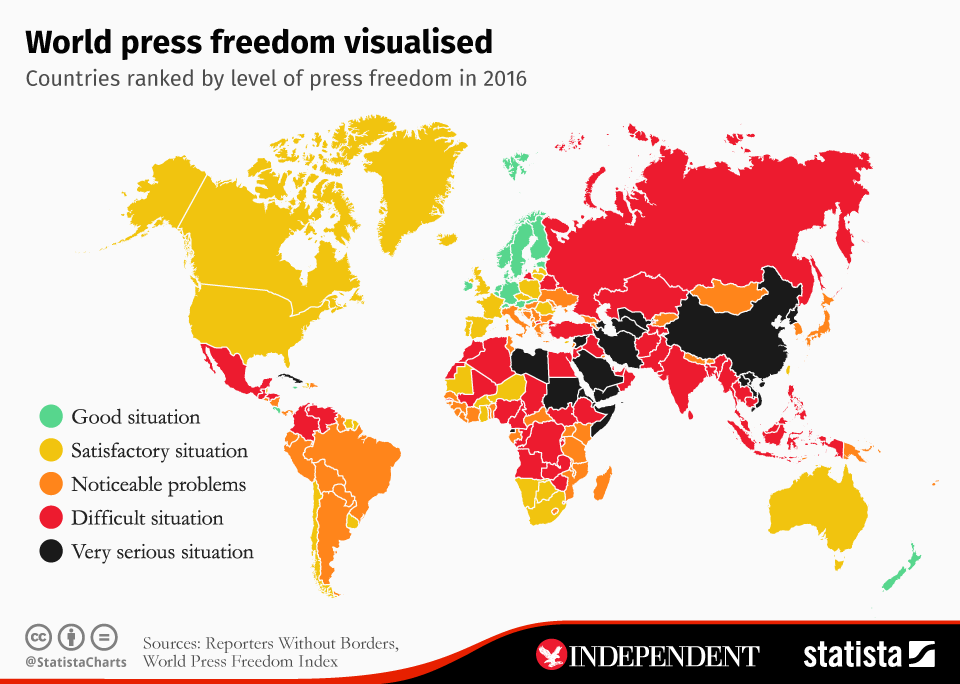World Press Freedom Day: Map shows the countries with the least press freedom in the world
The UK is described as having a 'satisfactory situation' but has dropped two places in the 2016 World Press Freedom Index

Your support helps us to tell the story
From reproductive rights to climate change to Big Tech, The Independent is on the ground when the story is developing. Whether it's investigating the financials of Elon Musk's pro-Trump PAC or producing our latest documentary, 'The A Word', which shines a light on the American women fighting for reproductive rights, we know how important it is to parse out the facts from the messaging.
At such a critical moment in US history, we need reporters on the ground. Your donation allows us to keep sending journalists to speak to both sides of the story.
The Independent is trusted by Americans across the entire political spectrum. And unlike many other quality news outlets, we choose not to lock Americans out of our reporting and analysis with paywalls. We believe quality journalism should be available to everyone, paid for by those who can afford it.
Your support makes all the difference.This map shows the countries where journalists are free to report the news – and the places in which the media is most strictly controlled.
The nations with the least press freedom are Eritrea, North Korea and Turkmenistan.
The UK is rated as having a “satisfactory situation” – worse than Germany, Ireland and Costa Rica which are all described as having a “good situation”.
The map, created for the Independent by statistics agency Statista, uses data from the Reporters Without Borders (RSF) 2016 World Press Freedom Index, which assessed how much freedom the media holds in 180 countries.
Press freedom around the world has fallen by nearly four per cent since last year, according to the report's measurements.
The secretary-general of RSF, Christophe Deloire, wrote in a statement that many world leaders are “developing a form of paranoia about legitimate journalism”, resulting in clampdowns on debate and independent reporting.
The country with the highest degree of press freedom is Finland, followed by the Netherlands, Norway, Denmark and New Zealand, which are all classed as having a "good situation" when it comes to reporting.
While Europe is still by far the continent with the highest degree of press freedom – followed by Africa, which overtook the Americas for the first time this year – it is far from perfect and the situation is worsening, according to RSF.
“The continent that respects media freedom most seemed to be on a downhill course,” RSF said in its report.
“Counter-espionage and counter-terrorist measures were misused. Laws were passed allowing mass surveillance. Conflicts of interest increased. Authorities tightened their grip on state media and sometimes privately owned media as well,” it said.
Poland has dropped 29 places in the rankings since 2015, despite still being described as “satisfactory”.
Earlier this year, the Polish government attracted criticism when it enacted a new law enabling the state to appoint management positions in public radio and television.
China is among the countries listed as having a "very serious situation" for press freedom.
Censorship and controls on press freedom in China are said to be tightening since president Xi Jinping came to power in 2012.
French journalist Ursula Gauthier was expelled from Beijing in December, after publishing an article that the government said “supported terrorism”.
Challenges to press freedom in the UK include a lack of laws guaranteeing press freedom, as well as pressure from the government following the publication of certain stories such as Edward Snowden’s whistleblowing allegations, according to a 2014 report by the World Association of Newspapers and News Publishers.
RSF has published the World Press Freedom Index annually since 2002.
Join our commenting forum
Join thought-provoking conversations, follow other Independent readers and see their replies
Comments